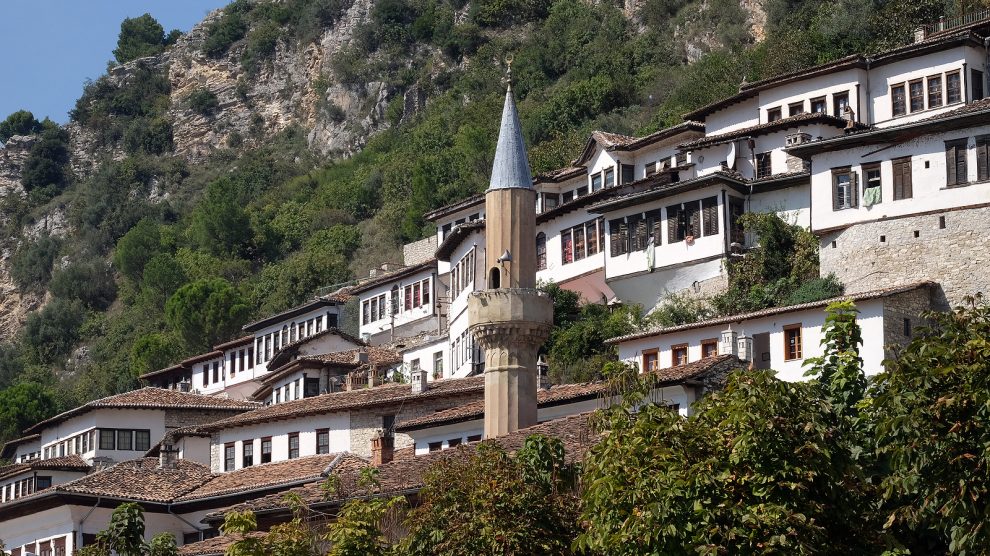On International Holocaust Remembrance Day, we remember the Albanians who risked their lives saving Jews.
After centuries of segregation and decades of pogroms across eastern Europe that killed hundreds of thousands of Jews and forced many more to emigrate, anti-Semitic violence in Europe reached an incomprehensible peak when Nazi Germany and their collaborationist allies systematically murdered six million Jews during World War II.
- Rewatching and reevaluating Holocaust epic Shoah
- Come and See: The greatest war film ever made
- Estonia’s Institute of Historical Memory: Preserving the memory of communism’s victims
This genocide of two-thirds of European Jewry is generally known as the Holocaust, and as the Shoah by many in Jewish communities. Jews from across Europe were deported to Nazi-occupied areas of Poland, where millions were worked to death in labour camps, starved in concentration camps, or outright exterminated in gas chambers. Mobile killing units used gas vans, mass shootings, and pogroms to kill millions more.
In addition to Jews, Nazi Germany also executed millions of Roma, Poles, Soviet civilians and prisoners of war, disabled people, communists, Jehovah’s Witnesses, and members of the LGBT+ community.
While Nazi Germany built and operated camps in Poland, the so-called Independent State of Croatia also built 22 concentration camps on its territory. Two camps were used exclusively for the children of Jews, Serbs, and Roma, many of whom were killed by poisoned milk and lethal injections. Memorials commemorating the children killed at one of these camps, Sisak, were destroyed in Croatia’s war for independence in the 1990s, and the camp’s main building is now a movie theatre called the Crystal Cube of Cheerfulness.
In another Balkans country, however, events took a different course.
A different story
In 1933, only 200 Jews lived in Albania. As Hitler consolidated power and began his ruthless persecution of German and Austrian Jews, the Albanian embassy in Berlin was the only European embassy to continue issuing visas to Jews through 1938. Albania became an important transit point for Jews fleeing to the Americas.
In 1939, fascist Italy invaded Albania and deposed its king. The country was subsequently occupied by Nazi Germany in 1943, following Italy’s surrender.
Unlike other nations occupied by Axis Powers, Albania ended World War II with a larger Jewish population than before it began; in fact, its Jewish population grew more than tenfold, swelled from refugees fleeing neighbouring countries. Only five Jews from Albania-proper, all from the same family, were killed by fascists during the Holocaust.
While thousands of everyday people across Europe betrayed their Jewish neighbours to collaborationist authorities, Albanian civilians and police alike sheltered and rescued them.
When Albanian police intercepted Jewish refugees fleeing from other countries, they often helped them find locals who would offer them shelter. Albanian bakers shuttered their shops ahead of Eid al-Fitr, one of the busiest periods of shopping in the predominantly-Muslim country, to make room to host Jewish guests.
Some Jews reported feeling safe enough to continue operating their small business through the occupation, trusting their neighbours would not turn them in and would notify them ahead of inspections by the fascist occupiers. One Albanian hid over 40 Jewish families in his home over the course of the war.

Enduring legacy
Yad Vashem, the State of Israel’s official memorial to the Shoah, honours non-Jews who altruistically helped Jews during the Holocaust. These gentiles are honoured as “Righteous Among the Nations” and are offered honorary Israeli citizenship and a tree planted in their honour in the Garden of the Righteous at Yad Vashem in Jerusalem (or their name added to the Wall of Honour in the Garden, as space for trees runs out).
Recipients of the honour who decide to live in Israel are entitled to a pension of the average national wage, free health care, and assistance with housing. To date, 75 Albanians have been recognised as Righteous Among the Nations.
In 1999, during the war with Serbia, Israel airlifted Kosovar Albanian refugees to Israel and provided them with medical care, food, and accommodation. In one instance, the descendants of an Albanian family that had sheltered a Jewish family during the Holocaust stayed with the descendants of that same Jewish family.
Since the fall of communism, almost all of Albania’s Jews have emigrated. But at a mosque in the historical town of Berat, a Star of David remains: a reminder of when Jews were welcomed to pray alongside their Muslim neighbours.
Unlike many news and information platforms, Emerging Europe is free to read, and always will be. There is no paywall here. We are independent, not affiliated with nor representing any political party or business organisation. We want the very best for emerging Europe, nothing more, nothing less. Your support will help us continue to spread the word about this amazing region.
You can contribute here. Thank you.







Add Comment